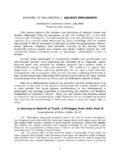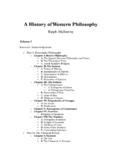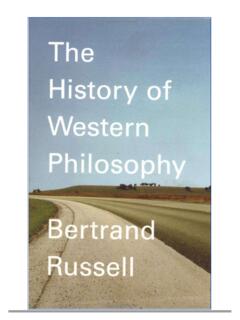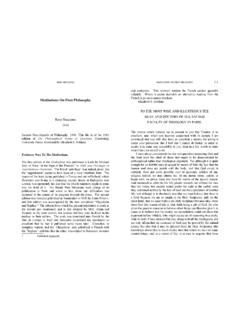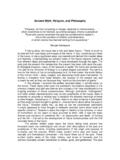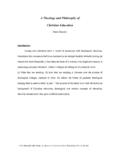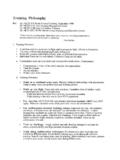Transcription of Islamic Philosophy from Its Origin to the Present ...
1 Philosophy in the Land of ProphecySeyyed Hossein NasrIslamicPhilosophyfrom itsOriginPresenttotheISLAMIC PHILOSOPHYFROM ITS ORIGINTO THE PRESENTSUNY series in IslamSeyyed Hossein Nasr, editorISLAMIC PHILOSOPHYFROM ITS ORIGINTO THE PRESENTP hilosophy in the Land of ProphecySeyyed Hossein NasrState University of New York PressPublished byState University of New York Press 2006 State University of New YorkAll rights reservedPrinted in the United States of AmericaNo part of this book may be used or reproduced in any manner whatsoeverwithout written permission. No part of this book may be stored in a retrieval systemor transmitte in any form or by any means including elecronic, electrostatic,magnetic tape, mechanical, photocopying, recording, or otherwisewithout the prior permission in writing of the information, address State University of New York Press,194 Washington Avenue, Suite 305, Albany, NY 12210-2384 Production by Marilyn P.
2 SemeradMarketing by Fran KenestonLibrary of Congress Cataloging-in-Publication DataNasr, Seyyed Philosophy from its Origin to the Present : Philosophy in theland of prophecy / Seyyed Hossein cm. (SUNY series in Islam)Includes bibliographical references and 0-7914-6799-6 (hardcover : alk. paper) ISBN 0-7914-6800-3(pbk. : alk. paper)1. Philosophy , Islamic . I. Title. II. 2006181'.07 dc222005023943 ISBN-13: 978-0-7914-6799-2 (hardcover : alk. paper)ISBN-13: 978-0-7914-6800-5 (pbk. : alk. paper)10987654321 The Quranic revelation is the light which enables one to is like the sun which casts light lavishly. Philosophical intelligenceis the eye that sees this light and without this light one cannot seeanything. If one closes one s eyes, that is, if one pretends to passby philosophical intelligence, this light itself will not be seenbecause there will not be any eyes to see it.
3 Mull S adr ContentsPrefaceixTransliterationxIntrodu ction: Philosophy and Prophecy1 PART 1. Islamic Philosophy AND ITS STUDY1. The Study of Islamic Philosophy in the Westin Recent Times: An Overview132. The Meaning and Role of Philosophy in ikmat al-Il hiyyah and Kal m49 PART 2. PHILOSOPHICAL ISSUES4. The Question of Existence and Quiddityand Ontology in Islamic Philosophy635. Post-Avicennan Islamic Philosophyand the Study of Being856. Epistemological Questions: Relations among Intellect,Reason, and Intuition within Diverse IslamicIntellectual Perspectives93 PART 3. Islamic Philosophy IN HISTORY7. A Framework for the Studyof the History of Islamic Philosophy1078. Dimensions of the Islamic Intellectual Tradition:Kal m, Philosophy , and Spirituality1199. The Poet-Scientist Umar Khayy m as Philosopher16510. Philosophy in Azarbaijan and the School of Shiraz18511.
4 The School of Isfahan Revisited209viiviiiContents12. Mull S adr and the Full Flowering ofProphetic Philosophy22313. From the School of Isfahan to the School of Tehran235 PART 4. THE CURRENT SITUATION14. Reflections on Islam and Modern Thought25915. Philosophy in the Land of ProphecyYesterday and Today273 Notes281 Index343 ContentsixPrefaceThis book is the result of nearly fifty years of study and meditationupon Philosophy and philosophical issues as seen in light of the reali-ties revealed through prophecy both objective and inward in the formof illumination. In a world in which Philosophy has become so di-vorced from revealed realities and secular thought has sought tomarginalize and even annihilate knowledge imbued with the sacred,it is necessary to return, whenever possible, to the theme of the rela-tion between Philosophy and prophecy through different perspectivesand angles of vision.
5 Years ago we dealt with the heart of the questionof the relation between knowledge and the reality of the sacred inKnowledge ad the Sacred and have returned to this subject from otherangles of vision in later works such as The Need for a Sacred the Present work we turn our gaze specifically upon philoso-phy and especially Islamic Philosophy . We deal with over a millen-nium of Islamic Philosophy , its doctrines, history, and approaches,from the angle of vision of the relation between that long philosophi-cal tradition and the realities of prophecy that have always dominatedthe horizon of the Islamic cosmos and the intellectual climate andspace of the Islamic people. Some of the chapters of this book werewritten as essays over the years. They have all been thoroughly re-vised and integrated into the framework of this book. Many otherchapters are new and were written specifically as integral parts of thepresent work in order to complete the picture that we have sought todepict in the pages that wish to thank the Radius Foundation, which provided finan-cial help to make the preparation of this text possible.
6 We are alsoespecially grateful to Katherine O Brien, who prepared and readied thehandwritten material and numerous alterations required patience, know-how, and energy to carry out a Herculean task. Without her help itwould not have been possible to Present the text for for the press. Having had to endure reading hundreds of pages ofTransliterationIntroductionPhilosophy and ProphecyIn the current cultural climate in the West as well as other parts of theglobe affected by modernism and postmodernism, Philosophy andprophecy are seen as two very different and, in the eyes of many,antithetical approaches to the understanding of the nature of was not, however, the case in the various traditional civilizationspreceding the advent of the modern world. Nor is it the case eventoday to the extent that the traditional worldview has survived. Need-less to say, by prophecy we do not mean foretelling of the future,but bringing a message from higher or deeper orders of reality to aparticular human collectivity.
7 Now the modes of this function havediffered from religion to religion, but the reality of prophecy isevident in worlds as diverse as the ancient Egyptian, the classicalGreek, and the Hindu, not to speak of the Abrahamic monotheisms inwhich the role of prophecy is so central. If we do not limit our under-standing of prophecy to the Abrahamic view of it, we can see thepresence of prophecy in very diverse religious climes in nearly all ofwhich it is not only of a legal, ethical, and spiritual significance butalso of a sapiental one concerned with knowledge. We see this realityin the world of the rishis in India and the shamans of diverse Shamanicreligions as well as in the iatromantis of the Greek religion and theimmortals of Taoism, in the illumination of the Buddha and later inthe Zen Buddhist masters who have experienced illumination or satori,as well as the prophets of the Iranian religions such as Zoroaster andof course in the Abrahamic prophets.
8 Consequently in all of theseworlds, whenever and wherever Philosophy in its universal sense hasflourished, it has been related to prophecy in numerous if we limit the definition of Philosophy to the intellectualactivity in ancient Greece known by that name, an activity that themodern Western understanding of history considers to be the originof philosophical speculation as such, the rapport between philosophyand prophecy can be seen to be a very close one at the very momentof the genesis of Greek Philosophy . We also come to realize that the12 Introductiontwo drifted apart only later and were not separated from each otherat the beginning of the Greek philosophical tradition. Let us just con-sider the three most important figures at the Origin of Greek philo-sophical speculation. Pythagoras, who is said to have coined the termphilosophy, was certainly not an ordinary philosopher like Descartes orKant.
9 He was said to have had extraordinary prophetic powers andwas himself like a prophet who founded a new religious Muslims in fact called him a monotheist (muwa id) and somereferred to him as a person often called the father of Western logic and phi-losophy was Parmenides, who is usually presented as a rationalistwho happened to have written a poem of mediocre quality. But as therecent brilliant studies of Peter Kingsley have clearly demonstrated,far from being a rationalist in the modern sense, he was deeply im-mersed in the world of prophecy in its Greek religious sense and wasa seer and In his poem, which contains his philosophicalmessage, Parmenides is led to the other world by the Daughters of theSun who came from the Mansion of Light situated at the farthestdegree of The answer to the question as to how this journeytook place is incubation, a spiritual practice well known in Greekreligion, one in which a person would rest completely still until his orher soul would be taken to higher levels of reality, and the mysteriesof existence would be Parmenides undertakes the inner journey until he meetsthe goddess who teaches him everything of importance, that is.
10 Teacheshim what is considered to be the Origin of Greek philosophical specu-lation. It is remarkable that when the goddess confronts Parmenides,she addresses him as kouros, that is, young man. This fact is remark-able and fascinating because in the Islamic tradition the very term forspiritual chivalry (futuwwah in Arabic and jaw nmard in Persian) isassociated with the word for youth (fat /jaw n), and this spiritual chiv-alry is said to have existed before Islam and to have been given newlife in Islam where its source is associated with Al ,4 who received itfrom the Prophet of Islam and where it was integrated into , Al has been associated by traditional Islamic sourceswith the founding of Islamic Greek figure who was given the title kouros wasEpimenides of Crete who also journeyed to the other world where hemet Justice and who brought back laws into this world.
